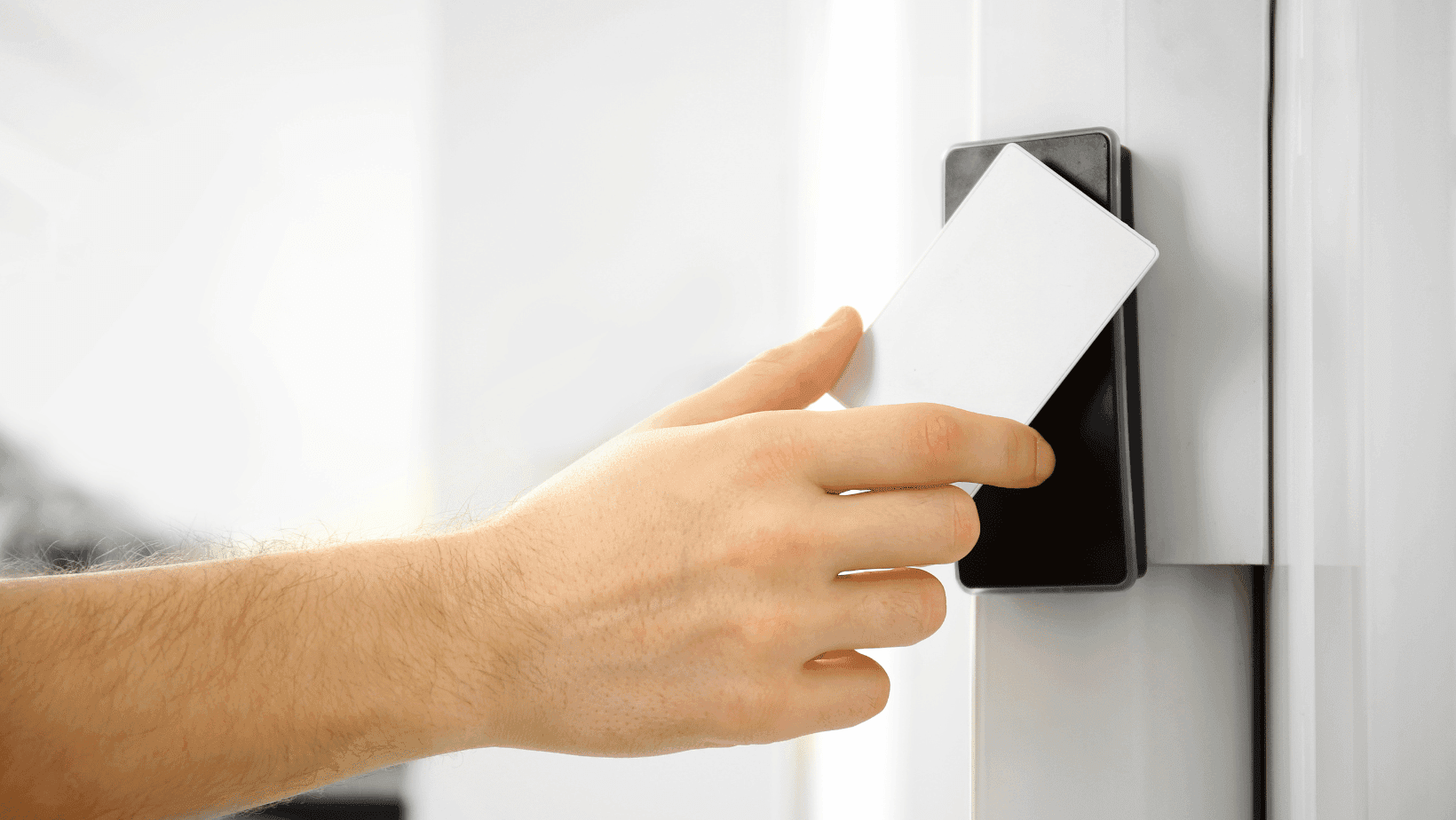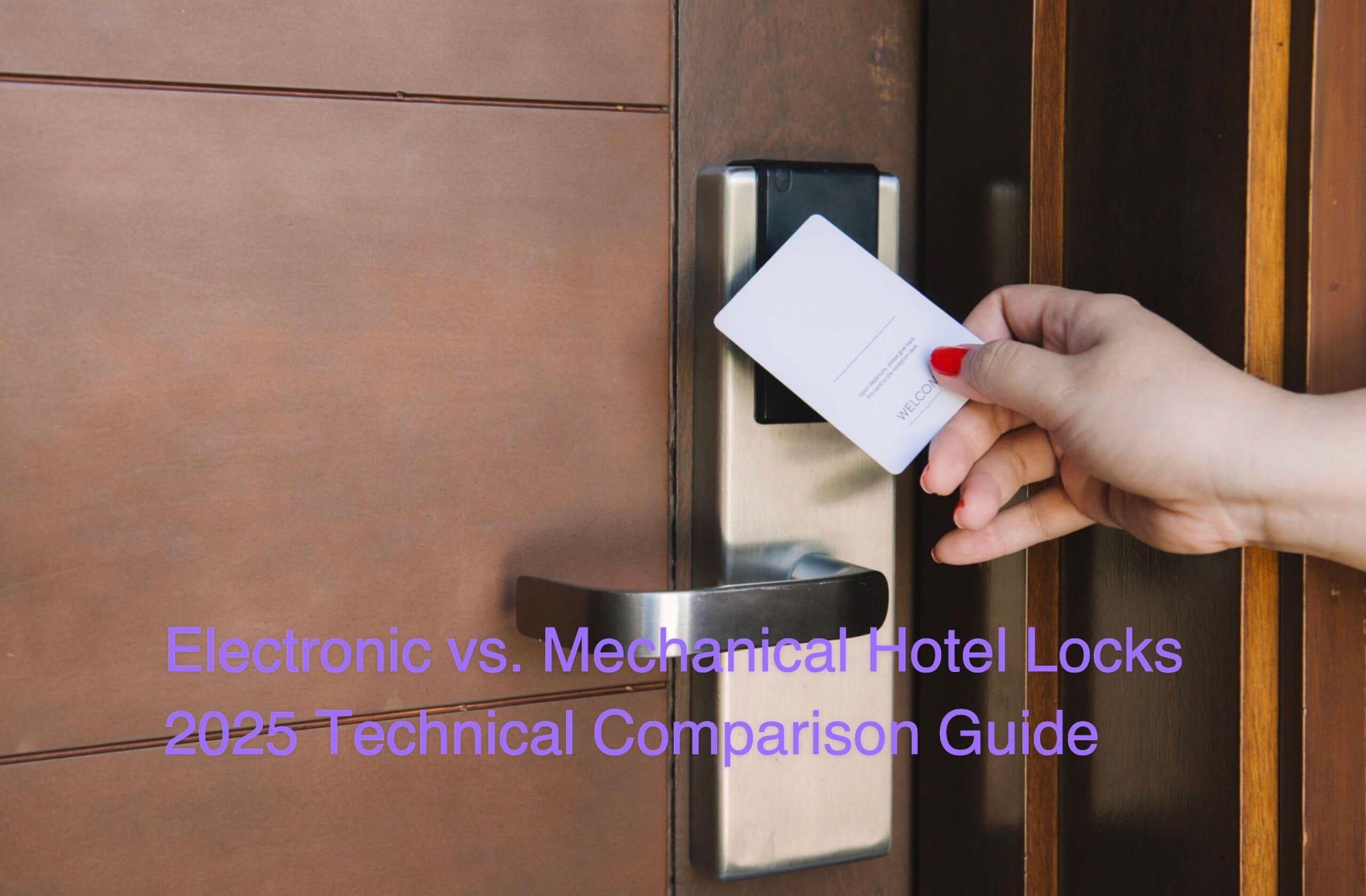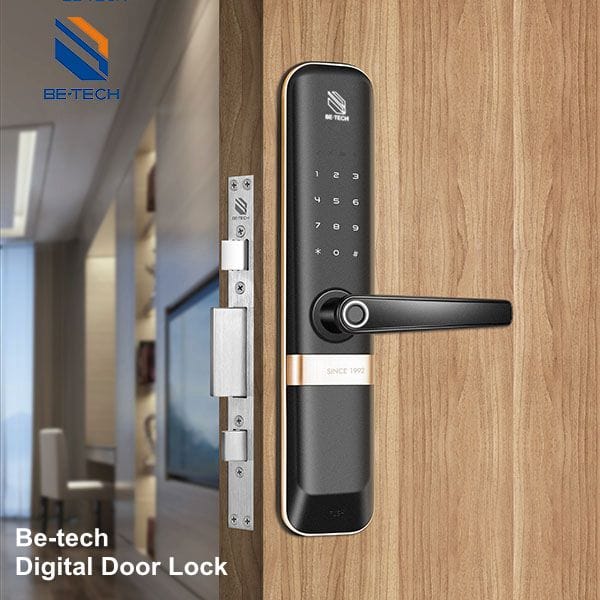Are you searching for the best hotel door locks to enhance guest safety and improve operational efficiency? With numerous options available, selecting the right lock can feel overwhelming.
In this comprehensive guide, we will examine the top five hotel door lock systems, each trusted by leading hotels around the globe. These include high-tech smart locks, reliable RFID systems, and traditional mechanical locks. Discover how these solutions can provide an ideal balance of security, affordability, and convenience for your property.
Let’s dive in!
1. RFID Hotel Door Locks
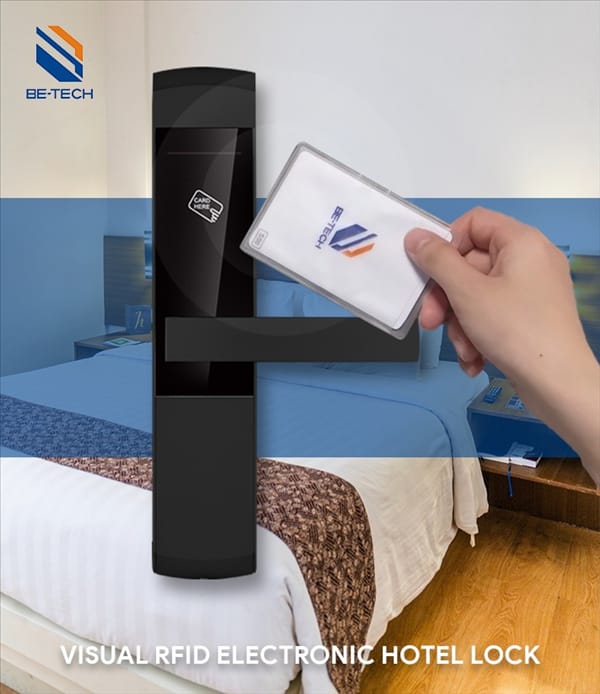
Radio-frequency identification (RFID) locks are an increasingly popular choice for hotels looking to implement a cost-effective and user-friendly access control solution. Here’s why these systems stand out:
How RFID Locks Work
RFID hotel locks utilize keycards embedded with digital credentials. When a guest taps their card on the lock reader, the credentials are transmitted via radio waves. If the credentials match, the door unlocks instantly, providing seamless access.
Benefits of RFID Locks
Affordability: Compared to other high-tech options, RFID systems offer a budget-friendly solution that does not compromise on security.
Ease of Use: Guests can quickly unlock doors with a simple tap, significantly enhancing their experience and reducing wait times.
Remote Management: Lost or stolen keycards can be deactivated remotely, ensuring enhanced security and peace of mind for both guests and hotel staff.
Best RFID Lock for Hotels
One of the top choices in the market is the ALV2 Slim Type RFID Lock by MIWA, which offers:
- Integration with Property Management Systems (PMS) and Point of Sale (POS) systems
- ANSI Grade 1 electronic lock certification for superior security
- Compatibility with master key systems
- Storage capability for the last 600 lock transactions
2. Mobile Access Smart Locks
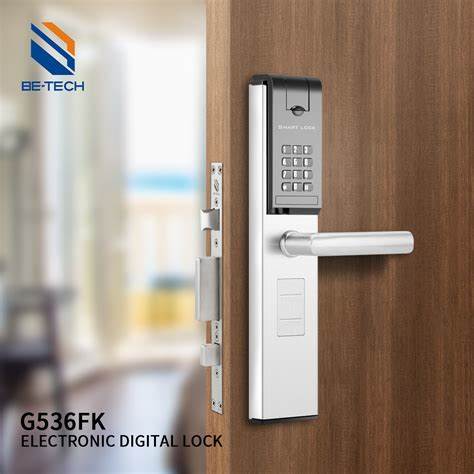
Mobile access smart locks are revolutionizing hotel security by transforming smartphones into secure room keys. Here’s why this technology is a game-changer:
How Mobile Access Works
Guests receive a unique digital key through the hotel’s mobile app. Using Bluetooth or Wi-Fi, their smartphone communicates with the lock, granting access once their credentials are verified.
Advantages of Mobile Access
Contactless Experience: Guests can bypass the front desk and head straight to their rooms, enhancing convenience.
Enhanced Security: Digital keys are encrypted and can be remotely revoked if a phone is lost or stolen, ensuring guest safety.
Personalization: Hotels can send targeted offers and upgrades directly through the mobile app, improving guest engagement.
Top Mobile Access Lock
One standout choice in this category is the Advantis – Revolution by Godrej, which features:
- A fingerprint sensor, RFID card reader, and mechanical key backup for versatile access options
- An auto-locking function for added security
- A privacy mode to ensure guest comfort
- Compatibility with video door phones for enhanced communication
3. Keypad Door Locks
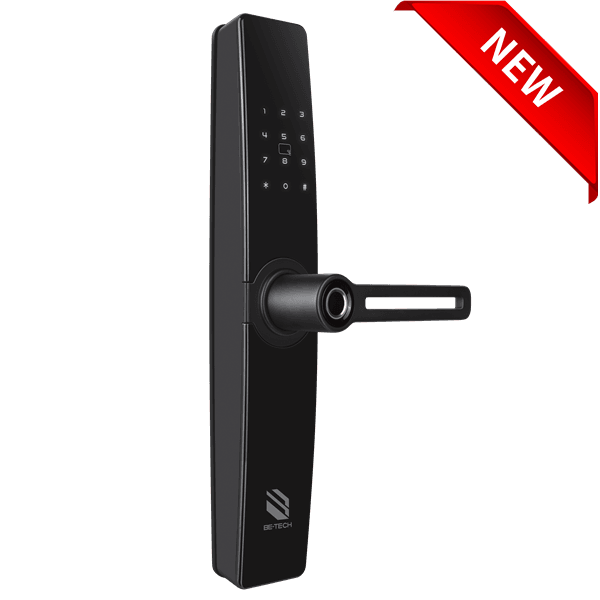
Keypad locks provide a convenient access solution that eliminates the need for keycards. Here’s why they are a reliable choice for hotels:
How Keypad Locks Work
Guests unlock doors by entering a unique PIN code on the lock’s keypad. This code can be easily changed between stays, ensuring security and flexibility.
Benefits of Keypad Locks
Simplicity: There are no keys or cards to manage or replace, making it easy for guests to access their rooms.
Cost-effective: Keypad locks are affordable and require minimal maintenance compared to traditional locking systems.
Customization: Hotels can program time-sensitive codes for housekeeping and maintenance staff, enhancing operational efficiency.
4. Biometric Hotel Locks
Biometric locks utilize advanced fingerprint or facial recognition technology to provide exceptional security and convenience for hotel guests. Here’s a closer look at their innovative features:
How Biometric Locks Work
During check-in, guests’ biometric data—such as fingerprints or facial scans—is captured and linked to their room access. To unlock the door, guests simply present their fingerprint or face to the lock’s scanner, ensuring quick and secure entry.
Advantages of Biometric Locks
Unmatched Security: Each guest’s biometric data is unique and virtually impossible to duplicate, significantly reducing the risk of unauthorized access.
Seamless Access: Guests no longer need to carry physical keys or remember codes, streamlining their experience.
Audit Trail: Biometric locks can record every entry attempt, providing valuable data for security audits and enhancing overall safety.
5. Networked Smart Locks
Networked locks communicate with the hotel’s PMS via Wi-Fi or Ethernet. This allows for real-time monitoring, remote lock control, and automatic guest data synchronization.
Benefits of Networked Locks
Centralized management: Staff can monitor and control locks from a single dashboard. Improved efficiency: Automatic check-in and check-out processes reduce workload and wait times. Customizable access: Grant temporary access to contractors or event attendees without key management hassles.
RFID Hotel Door Locks vs Mobile Access Smart Locks
RFID (Radio Frequency Identification) hotel door locks utilize electromagnetic fields to identify and track RFID-enabled key cards. Upon check-in, hotel staff program a unique RFID key card linked to the guest’s room number and stay duration. This key card contains a tag that communicates with a reader embedded in the door lock mechanism. When held near the reader, the card powers the tag, transmitting its unique identifier. If this data matches what the lock expects, it unlocks the door. This system is widely used in hotels due to its ease of use and enhanced security features, such as encryption and real-time access control. Key components include the RFID key card, antenna, reader, and lock mechanism—each designed for quick and reliable access without physical contact.
Mobile access smart locks allow users to unlock doors via their smartphones or other connected devices using technologies like Bluetooth Low Energy (BLE) or Near Field Communication (NFC). These locks eliminate physical keys by enabling users to control access through a dedicated app. Key features include remote access capabilities, activity monitoring, and integration with smart home systems. The advantages of mobile access smart locks encompass convenience, temporary access codes for guests or service personnel, and real-time notifications about lock activity. However, potential drawbacks include reliance on battery power and internet connectivity, which may pose challenges during outages or technical failures.
Comparing RFID hotel door locks with mobile access smart locks reveals distinct strengths and weaknesses for each option. RFID locks are well-established in the hospitality industry; they provide reliable security without requiring guests to manage additional devices. They offer easy reprogramming of lost cards and can integrate into hotel management systems for enhanced operational efficiency. However, they may lack flexibility compared to mobile access systems regarding user control.
Mobile access smart locks provide superior flexibility through smartphone integration, allowing remote management of access permissions. They are ideal for tech-savvy users who prefer keyless entry solutions but come with higher installation costs and potential vulnerabilities related to battery life and connectivity issues.
| Feature | RFID Hotel Door Locks | Mobile Access Smart Locks |
|---|---|---|
| Access Method | RFID key card | Smartphone app |
| Convenience | Easy tap access | Keyless entry via mobile device |
| Integration | Limited to hotel management systems | Integrates with smart home devices |
| Security | Encrypted communication | Advanced security features (e.g., notifications) |
| User Control | Manual reprogramming required | Remote access management |
| Installation Cost | Generally lower | Typically higher |
| Power Dependency | No external power required | Relies on battery/internet connection |
RFID hotel door locks offer a proven solution for hotels focusing on security and operational efficiency without requiring guests to manage additional technology. Conversely, mobile access smart locks cater to modern users seeking flexibility and advanced control over their property access but may face challenges related to technology reliance. Each system serves different needs within the hospitality landscape; thus, choosing between them depends on specific requirements and preferences.
RFID Hotel Door Locks vs Keypad Door Locks
RFID (Radio Frequency Identification) hotel door locks utilize a contactless system that enables guests to unlock their doors using an RFID keycard. Upon check-in, hotel staff program a unique keycard specifically for each guest’s stay duration. This card is embedded with a chip that wirelessly communicates with the lock’s reader. To gain access to their room, guests simply hold their keycard near the lock; it verifies the data and unlocks the door if authorized. RFID locks are increasingly prevalent in modern hotels due to their enhanced security features, user-friendliness, and seamless integration with hotel management systems for real-time access control and data tracking. Key components of this system include the RFID reader, keycard, and lock mechanism itself. Their usage extends beyond room access; they can also manage entry to restricted areas within the hotel, ensuring a secure environment for both guests and staff.
Keypad door locks operate by requiring users to input a numerical code on a keypad to unlock the door. This system eliminates the need for physical keys while offering convenience since users can easily remember their codes. Generally easy to install, keypad locks are often more affordable than RFID systems. They provide increased security because they cannot be picked like traditional locks; however, they have notable drawbacks: if someone learns or hacks the code, unauthorized access is possible. Additionally, users must remember their codes; forgetting them risks being locked out. Keypad locks also depend on batteries that require regular monitoring and replacement for continued functionality.
When comparing RFID hotel door locks with keypad door locks, each has distinct strengths and weaknesses. RFID locks offer superior security through encrypted communication and are less prone to wear since they do not require physical contact for operation. They enhance guest experiences with features like mobile check-in and personalized access control options. However, they may entail higher upfront costs and could fail during power outages. Conversely, keypad locks tend to be more budget-friendly and easier to install but carry risks of hacking while requiring users to memorize codes. They may also become inoperable if batteries die or during power failures.
| Feature | RFID Hotel Door Locks | Keypad Door Locks |
|---|---|---|
| Security | High (encrypted communication) | Moderate (vulnerable to code hacking) |
| Ease of Use | Contactless access | Code entry required |
| Installation Cost | Higher initial cost | Generally lower cost |
| Durability | More durable (less wear on cards) | Durable but dependent on battery life |
| Integration | Integrates with hotel management systems | Limited integration options |
| Guest Experience | Streamlined check-in and access | Simple but requires code memorization |
RFID hotel door locks excel in terms of security, convenience, and integration capabilities but come with higher costs and potential power dependency issues. On the other hand, keypad door locks, while being more budget-friendly and straightforward to install, face challenges related to security vulnerabilities as well as user memory reliance for codes. The choice between these options ultimately depends on specific needs regarding security levels, budget constraints, and user convenience preferences.
RFID Hotel Door Locks vs Biometric Hotel Locks
RFID hotel door locks utilize radio frequency identification (RFID) technology to provide secure access to guest rooms. These advanced locking systems operate through RFID readers installed on doors and RFID tags embedded in keycards or fobs. When a guest presents their card or fob near the reader, it emits radio waves that activate the tag. The tag then transmits its unique identifier back to the reader, which verifies the guest’s access rights and unlocks the door. This technology is recognized for its enhanced security features since RFID tags are notably difficult to duplicate. Additionally, these locks offer greater convenience compared to traditional keys; guests can easily unlock their doors without fumbling with physical keys. As a result, RFID hotel door locks have become prevalent in the hospitality industry due to their improved key management capabilities, tracking features, and heightened safety for both staff and guests.
In contrast, biometric hotel locks rely on unique biological traits—such as fingerprints or facial recognition—to confirm a guest’s identity before granting access. To unlock their doors, guests simply place their finger on a fingerprint scanner or position themselves in front of a facial recognition camera. The system compares their biometric data against a secure database of authorized users; if a match is found, the door unlocks seamlessly. Many consider biometric locks more secure than RFID locks, as replicating biometric data is significantly more challenging. However, these systems can be more costly to install and maintain compared to RFID options. Furthermore, some guests may express discomfort regarding sharing their biometric information with hotels.
Both RFID hotel door locks and biometric hotel door locks present distinct advantages over traditional key-based systems. While RFID locks tend to be more affordable and user-friendly for guests, biometric options provide superior security measures. Ultimately, selecting the best locking solution for a specific hotel will depend on various factors such as budget constraints, required security levels, and guest comfort preferences.
| Feature | RFID Hotel Door Lock | Biometric Hotel Door Lock |
|---|---|---|
| Technology | Radio Frequency Identification | Fingerprint or Facial Recognition |
| Entry Method | Tap or swipe keycard/fob | Fingerprint scan or facial scan |
| Security | Enhanced; difficult to duplicate keys | High; very difficult to replicate biometric data |
| Cost | Generally more affordable | Typically more expensive |
| User Experience | Convenient and easy to use | Convenient but may raise privacy concerns for some guests |
| Prevalence | Widely adopted in hotels | Emerging trend; often found in higher-end hotels |
| Integration | Compatible with hotel management systems | Compatible with hotel management systems |
| Key Components | RFID reader, RFID tag, software | Biometric scanner, database, software |
| Maintenance | Generally low maintenance | Higher due to complex technology |
| Typical Usage | Guest room access; staff access control | Guest room access; high-security areas |
RFID Hotel Door Locks vs Networked Smart Locks
RFID hotel door locks are advanced electronic locking mechanisms that utilize radio-frequency identification (RFID) technology. These locks feature an RFID reader installed on the door paired with an RFID tag embedded within a keycard or fob. When the tag is brought within range of the reader, it transmits its unique identifier; upon verification by the reader, the door unlocks. RFID locks are recognized for their user-friendly operation and enhanced security features such as encryption and access tracking. They are extensively utilized in the hospitality industry for various applications including guest room access, staff access control, and securing sensitive areas like pools and fitness centers.
Networked smart locks, on the other hand, provide a more sophisticated approach to access control by connecting to a centralized network that enables robust remote management capabilities. These locks typically employ technologies such as Bluetooth and Wi-Fi, facilitating features like mobile access via smartphones, real-time monitoring of entry points, and seamless integration with hotel management systems. Networked smart locks significantly enhance the guest experience by streamlining check-in processes and offering convenient keyless entry options. However, they tend to be more costly to install and maintain compared to RFID locks. Furthermore, reliance on a network can introduce security vulnerabilities and create challenges during power outages.
Both RFID hotel door locks and networked smart locks present distinct advantages over traditional key-based systems. Generally speaking, RFID locks are more cost-effective and simpler to implement while delivering enhanced security and convenience. In contrast, networked smart locks, although pricier, provide superior control and integration capabilities that appeal to hotels prioritizing advanced management solutions and enriched guest experiences. Ultimately, the choice between these two options hinges on factors such as the hotel’s budget constraints, specific security needs, and desired level of technological sophistication.
| Feature | RFID Hotel Door Lock | Networked Smart Lock |
|---|---|---|
| Technology | Radio Frequency Identification (RFID) | Bluetooth & Wi-Fi Connectivity |
| Entry Method | Tap or swipe keycard/fob | Smartphone app & Keycard/Biometrics |
| Security Level | Enhanced; difficult to duplicate keys | High; customizable access with remote revocation but vulnerable to network issues |
| Installation Cost | More affordable initial investment | Higher installation costs due to technology complexity |
| User Experience Quality | Convenient & straightforward for users | Highly convenient but may pose tech barriers for some guests |
| Market Prevalence | Widely adopted across hotels globally | Gaining popularity in modern hotel settings |
| Integration Capability | Compatible with hotel management systems | Extensive integration with management systems & smart features |
| Key Components Required | RFID reader & software system | Lock mechanism & Network connection with optional smartphone app |
| Maintenance Needs | Generally low maintenance requirements | Higher maintenance needs due to reliance on network infrastructure |
| Common Usage Scenarios | Guest room access & staff control in restricted areas | Guest room access & integrated energy-saving features |
Choosing the Right Hotel Door Lock
When selecting a hotel door lock system, it’s essential to consider several key factors that can significantly impact security and guest satisfaction:
Security:
Opt for locks featuring advanced encryption technologies and tamper-proof designs to safeguard against unauthorized access.
Compatibility:
Ensure that your lock system integrates seamlessly with your Property Management System (PMS) and other hotel operations, facilitating efficient management.
Guest Experience:
Choose locks that provide convenient, contactless access options, enhancing the overall guest experience while ensuring safety.
Scalability:
Select locks that can adapt to your property’s evolving needs, allowing for easy upgrades as your business grows.
Support:
Partner with a reputable vendor who offers reliable installation, comprehensive training, and ongoing maintenance services to ensure optimal performance.
Conclusion
Investing in the right hotel door locks is crucial for ensuring guest safety, streamlining operations, and enhancing the overall guest experience. By exploring the top 5 hotel door lock systems – RFID, mobile access, keypad, biometric, and networked locks – you can find the perfect solution for your property’s unique needs and budget.
Remember, the best hotel door lock system is one that combines robust security with user-friendly features and reliable performance. By prioritizing these factors, you can give your guests peace of mind and set your property apart from the competition.
Ready to upgrade your hotel’s door locks? Contact our experts at akmelock.com today to discover how our cutting-edge lock solutions can transform your property’s security and guest experience.


